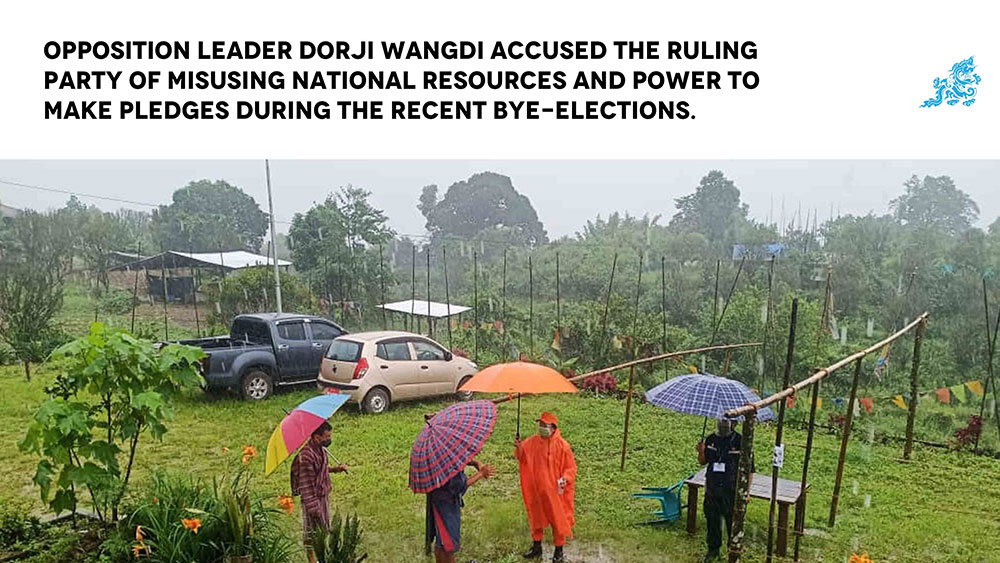MB Subba
Losing three bye-elections and reduced to 15 members from 17 in a spate of two years, should the Opposition Party, Druk Phuensum Tshogpa (DPT) be concerned about its long-term election prospects?
The answer is mixed.
The advantage of being in the Ruling Party, many are convinced, make the difference in bye-elections, as political parties entice voters with pledges and convince them of delivering them because of the ruling party advantage.
DPT, unlike some think, is not losing its support base or its stronghold in some of the dzongkhags, according to its members.
Opposition Leader Dorji Wangdi said that the Opposition Party was disadvantaged in the bye-elections. “We are definitely disheartened to lose three bye-elections. But we are not concerned about the future of our party as the size of the Opposition didn’t matter in past elections.”
He accused the ruling party of misusing national resources and power to make pledges. He said that DPT made “honest and reasonable pledges” for the bye-elections, but that the ruling party’s pledges were accompanied by false information and misrepresentation of facts.
“For instance, they said that only the government had the authority to allocate national resources, which is not true,” he said, adding that all the members of the National Assembly were involved in passing the budget as a money Bill.
He said DPT had emerged as a stronger Opposition Party with 17 MPs in the 2018 parliamentary elections although it had lost the North Thimphu bye-election in the second government’s term after the resignation of its former MP Kinga Tshering.
After the 2008 landslide victory where it swept 45 of the 47 constituencies, the DPT’s share of votes has also steadily declined. From 67.04 percent of the total votes in the 2008 general elections, the party’s share of votes in the primaries declined from 44.52 percent in 2013 to 30.92 percent in 2018.
However, DPT’s share of votes in the last two general elections declined from 45.12 percent in 2013 to 45.05 percent in 2018, which some believe could mean that it still has a strong base.
The DNT’s share of votes in the primaries increased from 17.04 percent in 2013 to 30.92 percent in 2018. The ruling party secured 54.95 percent of the votes in the 2018 general elections.
When DNT won the Mongar and Nganglam bye-elections last week, many assumed DPT was losing its grip in the east, which was traditionally considered their stronghold.
Although DNT’s Karma Dorji won Nganglam, DPT’s Rinchen Pelzang won more than 44 percent of the votes.
DNT’s Karma Lhamo won by a huge margin, 67 percent of the 6,184 votes cast in Mongar. DPT’s Dorji Youden won about 33 percent of the votes.
A verdict on the government’s performance?
Some of the members of the Ruling Party were quick to conclude that the election results were a verdict on the government’s performance.
The results, DNT’s secretary general, Phurba, said were an endorsement of the government’s performance to a certain extent. “The results are an indication that people are happy with the government and they a ground for optimism in the 2023 elections,” he said, adding that the constituencies had voted for DNT not only because it was the ruling party but also because the candidates were “capable”.
The bye-elections were also held amid the government’s proposal to lift the 10-year-old tobacco ban and the discussions surrounding the Mines and Mineral Bill 2020, where the government was portrayed as against what the National Council says is equal distribution of national wealth.
Another issue that mattered in the bye- election was the government’s handling of the coronavirus pandemic. Although the private sector has suffered the most amid the Covid-19 pandemic, the government’s success to keep the number of Covid-19 cases low, according to neutrals, had an impact on the bye-elections.
A People’s Democratic Party (PDP) member said that the bye-election outcome sent a mixed message to parties outside of Parliament. “The ruling party always remains a strong contender in the primaries. The decline in the support base of the Opposition Party is good for the parties that are not represented in Parliament.
They disagree on the government’s achievement being the reason behind winning bye-elections. “It’s intriguing that the ruling party has won despite its poor performance in terms of economic development and delivery of its election pledges,” he said.
No level playing field?
Bye-elections, many say, cannot preempt outcomes of general elections or party strengths. In a bye-election, the choice is made easier for voters because they are voting for a member that would be in the ruling or opposition, a Thimphu-based voter said.
“Smart voters would vote for the Ruling Party, as there was not much to gain by voting for the Opposition Party,” he said. “They expect development activities to come if they vote for the Ruling Party,” he said.
However, he said that bye-elections also provided the government another opportunity to prove that they can fulfill pledges. He said that voters would give a second thought on voting for the ruling party if the pledges remain unfulfilled. “It will be a reference point for future bye-elections.”
The DNT has promised to construct a 50-bedded hospital in Nganglam and blacktop all the gewog centre (GC) and farm roads in the constituency. Karma Lhamo has promised to push for an airport in Mongar among other pledges.
Others said the situation would change when it comes to general elections. “Political parties campaign on pledges and not ideologies. The candidates also matter and parties hunt for candidates that have chances to win,” said an observer.
Members of the opposition also agree that voters do not see much reason to vote for the Opposition Party in bye-elections while the primaries are a level playing field for all the contesting parties.


